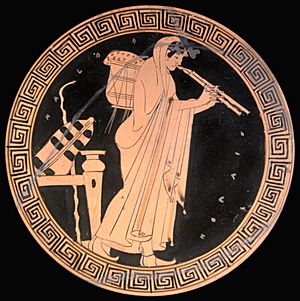Mimnermus facts for kids
Mimnermus (Greek: Μίμνερμος Mírmernos) was an ancient Greek poet who wrote elegies. He lived around 632–629 BC. He was from either Colophon or Smyrna, two cities in a region called Ionia.
Mimnermus was greatly inspired by the famous poet Homer. However, Mimnermus wrote shorter poems. These poems were often performed at parties where people drank and talked. Ancient writers mostly remembered him as a poet who wrote about love and feelings.
Mimnermus also influenced later poets, like Callimachus and Propertius. Propertius even thought Mimnermus was better than Homer when it came to writing about love.
Ancient scholars collected his work into just two "books." This was a small number compared to other poets. Today, only small pieces of his poems still exist. These pieces show that he was a very skilled poet. They also suggest he was a stronger person than some ancient writers thought. We don't have many reliable details about his life. One old story says he was connected to a flute player named Nanno. One of his two books was even named after her.
Contents
Life of Mimnermus
It's hard to know many exact details about Mimnermus's life. An old book called the Suda mentions him, but it has some missing parts. It likely said he wrote two books of poems.
Most people think Mimnermus was from Smyrna. Another island, Astypalaea, was also mentioned as a possible home, but this is probably not true.
Mimnermus and Solon
A wise Athenian lawmaker and poet named Solon admired Mimnermus's skills. Solon called him Ligyaistades, which means "sweet-voiced." However, Solon didn't agree with Mimnermus's ideas about enjoying life too much.
Mimnermus once wrote:
Would that my fated death might come at sixty, unattended by sickness and grievous cares.
Solon thought people should be willing to live to eighty. Another ancient writer, Plutarch, also criticized Mimnermus for focusing too much on pleasure. He called one of Mimnermus's poems "the words of people who can't control themselves."
But Mimnermus wasn't shy about his views. One poem, also linked to another poet named Theognis, encouraged people to enjoy themselves. It said: "Enjoy yourself. Some of the harsh citizens will speak ill of you, some better."
Mimnermus the Patriotic Poet
Mimnermus also showed a strong side to his personality. He was a versatile poet, meaning he could write about many things. In ancient times, elegies were often used to inspire courage during wars. They also celebrated national achievements. Mimnermus did this too.
One quote from him, written down by the geographer Strabo, is the oldest surviving story about the Ionian migration. This was when people from Pylos settled in Colophon and Smyrna.
Another quote describes a Greek warrior's brave actions against the cavalry of the Lydian king, Gyges. This happened in the early 7th century BC. Mimnermus likely wrote this to encourage his people to fight against the Lydians.
Some believe Mimnermus's name might have been chosen to remember a victory by Smyrna against Gyges near the Hermus river. Names ending in -ermus were common in Ionia.
Mimnermus was alive when Smyrna was attacked for the last time by the Lydians under Alyattes of Lydia. He might have died when the city fell. Smyrna then disappeared for about 300 years. This might be why Colophon later claimed Mimnermus as their own poet. But Smyrna's claim continued, suggesting it was the true one.
Myths and Stories
Smyrna was near Mount Sipylos. One of its rocky parts was thought to be the sad figure Niobe. Like other ancient poets, Mimnermus changed myths to fit his poems. A writer named Aelian said Mimnermus wrote that Niobe had twenty children. Homer, for example, said she had twelve.
Mimnermus also wrote imaginative stories about the sun. He described it traveling at night from west to east in a golden bed. He also wrote about Jason the Argonaut's journey to "Aeetes' city, where the rays of the swift Sun lie in a golden storeroom at the edge of Oceanus." These stories survive in short quotes from ancient writers.
Mimnermus and Nanno
Epic poems and lyric poems were usually played with stringed instruments like the cithara or barbiton. But elegies were played with a wind instrument called the aulos. This meant that at least two people were needed for a performance: one to sing and one to play the aulos.
Ancient stories connect Mimnermus with a female aulos player named Nanno (Ναννώ). One story even says he was her friend or lover. Mimnermus could also play the aulos himself. Strabo described him as "both a pipe-player and an elegiac poet."
The poet Hipponax said that when Mimnermus played the aulos, he used a sad tune called the "fig-branch strain." This was a traditional melody played during a ritual where people were driven out of town, sometimes whipped with fig branches.

Ancient writers sometimes mention a work by Mimnermus called Nanno. There is also a clear mention of a work called Smyrneis. Modern scholars believe these were the two books of poems mentioned earlier.
The Nanno seems to have been a collection of short poems about different topics, not just love. The Smyrneis appears to have been a longer poem, almost like an epic, about Smyrna's battles with the Lydians.
A comment by the poet Callimachus seems to refer to these two books. He praised one for its "sweetness" and called the other "the great lady." The "great lady" likely refers to Smyrneis. The "sweet verses" probably refer to Nanno, which Callimachus used as a model for his own short, simple poems. However, this comment is only a small piece, and scholars don't all agree on what it means.
Poetic Style
Mimnermus's poems were often written in elegiac couplets. This means they had pairs of lines, usually a longer line followed by a shorter one. This style allowed poets to share their ideas in short, powerful phrases. These phrases were often made more memorable by words that rhymed or sounded similar within the lines.
Here is an example of his poetry, Fragment 1, which shows his style:
-
-
-
-
-
- Fragment 1
-
-
-
- τίς δὲ βίος, τί δὲ τερπνὸν ἄτερ χρυσῆς Ἀφροδίτης;
- τεθναίην, ὅτε μοι μηκέτι ταῦτα μέλοι,
- κρυπταδίη φιλότης καὶ μείλιχα δῶρα καὶ εὐνή·
- οἷ’ ἥβης ἄνθεα γίγνεται ἁρπαλέα
- ἀνδράσιν ἠδὲ γυναιξίν· ἐπεὶ δ’ ὀδυνηρὸν ἐπέλθῃ
- γῆρας, ὅ τ’ αἰσχρὸν ὁμῶς καὶ καλὸν ἄνδρα τιθεῖ,
- αἰεί μιν φρένας ἀμφὶ κακαὶ τείρουσι μέριμναι,
- οὐδ’ αὐγὰς προσορῶν τέρπεται ἠελίου,
- ἀλλ’ ἐχθρὸς μὲν παισίν, ἀτίμαστος δὲ γυναιξίν·
- οὕτως ἀργαλέον γῆρας ἔθηκε θεός.
-
Here is the poem in English, trying to keep a similar rhythm:
-
- What is life, what is sweet, if it is missing golden Aphrodite?
- Death would be better by far than to live with no time for
- Secret friendships and gentle gifts and quiet moments,
- All of those things that give youth all of its treasured bloom,
- Both for men and for women. But when there arrives the pain
- Of old age, even good looks change to something unpleasant,
- And the heart wears away under the endlessness of its worries:
- There is no joy anymore then in the light of the sun;
- Children dislike him, and women show him no respect.
- So difficult has old age been made for us all by God!
- What is life, what is sweet, if it is missing golden Aphrodite?
The writer Maurice Bowra said about this poem that it starts with a bold opening. Then it quickly talks about youth. As it moves to the difficulties of old age, the lines become slower and shorter. The poem ends with a strong, summarizing line.
Among other early elegiac poets, only Archilochus can be compared to Mimnermus for his skillful use of language. Both were very talented poets throughout their lives.
What Other Poets Said
Solon's Advice
As mentioned before, Solon criticized Mimnermus for wishing to die at sixty. He told Mimnermus:
|
ἀλλ᾽ εἴ μοι κἂν νῦν ἔτι πείσεαι, ἔξελε τοῦτον:— |
But if even now you will listen to me, remove this (meaning Mimnermus's poem)— |
Propertius's View
The Roman poet Propertius wrote:
|
plus in amore valet Mimnermi versus Homero: :carmina mansuetus lenia quaerit Amor. |
In love, Mimnermus's verses are stronger than Homer's. |
Horace's Comment
Another Roman poet, Horace, said:
|
si, Mimnermus uti censet, sine amore iocisque |
If, as Mimnermus believes, without love and fun |
Translations
- Mimnermus: Elegies (with an Introduction, Translation and Commentary) by Dimitrios Kanellakis (Aris & Phillips Classical Texts)
- Greek lyric: an anthology in translation By Andrew M. Miller
- Greek Elegiac Poetry (edited and translated) by Douglas E. Gerber (Loeb Classical Library)
- Several fragments translated by Steve Hays
- Translation of Fragment 2 into Elegiac couplets
See also
 In Spanish: Mimnermo para niños
In Spanish: Mimnermo para niños
 | Madam C. J. Walker |
 | Janet Emerson Bashen |
 | Annie Turnbo Malone |
 | Maggie L. Walker |



